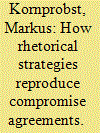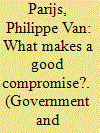|
|
|
Sort Order |
|
|
|
Items / Page
|
|
|
|
|
|
|
| Srl | Item |
| 1 |
ID:
114808


|
|
|
|
|
| Publication |
2012.
|
| Summary/Abstract |
How do actors, once they have reached agreement on a compromise, make this compromise persist? Being rooted in mutual concessions, it can never be taken for granted that compromises, once agreed upon, stay in place. Contestation about compliance is something that is very much to be expected and does not inevitably destabilize a compromise. Whether such a destabilization occurs or not depends on how actors communicate with one another. I contend that whether compromise persists or not has a great deal to do with the interplay of offensive and defensive rhetorical strategies that actors employ. I identify six offensive strategies (recourse, elaboration, entrapment, accusation, ostracism, abandonment) and six defensive ones (accommodation, placation, denial, deflection, inattentiveness, rejection), and chart the degrees to which offensive-defensive exchanges of strategies are conducive to reproducing compromises. Recourse-accommodation interplays on the one hand (most conducive) and abandonment-rejection interplays on the other (least conducive) form the poles of the spectrum of exchanges. I probe my theoretical framework by inquiring into the stability of the grand compromise that underpins the nuclear non-proliferation regime. The findings support my framework. The parties have tended to stay away from heavy rhetorical artillery and stuck to less robust rhetorical strategies. Elaboration and placation strategies have played a particularly important role for making the grand compromise persist.
|
|
|
|
|
|
|
|
|
|
|
|
|
|
|
|
| 2 |
ID:
114813


|
|
|
|
|
| Publication |
2012.
|
| Summary/Abstract |
A compromise is an agreement that involves mutual concessions. Each party gets less than it feels entitled to, but agrees to it because the situation it anticipates under the deal is better than the one it expects in the absence of a deal: conflict, exit or arbitration by a third party. Some compromises, however, are bad, and others are good. This article discusses three conjectures about what it is that makes a compromise good. Is a good compromise an honourable compromise, one that enables each party to save face? Is it rather a fair compromise, one that contributes to the progress of justice independently defined? Or is it a Pareto-improving compromise, one that changes things in such a way that it ends up making everyone better off than under the status quo? A compromise is never as good as a consensus, but it is generally better than nothing, and often achievable when a consensus is not. And when it is, trying to make it as good as possible in each of the three ways described is always worthwhile.
|
|
|
|
|
|
|
|
|
|
|
|
|
|
|
|
|
|
|
|
|